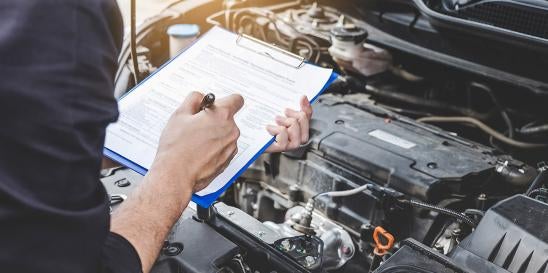Key Developments
- GM expects new labor contracts with the UAW and Unifor to increase its costs by $9.3 billion, or approximately $575 per vehicle on average through the life of the contracts.
- Ford projects the new labor contracts will increase its costs by $8.8 billion, or roughly $900 per vehicle, by 2028.
- Ward’s Intelligence estimates total U.S. new-vehicle sales in November reached a seasonally adjusted annualized rate (SAAR) of 15.3 million units, and sales could have been roughly 4% higher if not for the impact of strike-related plant shutdowns.
- Bain & Company analysis indicates automaker profit margins in the third quarter of 2023 were on average three percentage points higher than suppliers. This represents a narrower gap compared to Q2 2023, but it is comparable to Q1 2023.
- On December 1, the U.S. Treasury Department released proposed guidance to establish when EVs using certain critical minerals or battery components sourced from “foreign entities of concern” would prevent consumers from accessing tax credits of up to $7,500 per vehicle under the Inflation Reduction Act.
- Battery-electric vehicles are projected to represent approximately 9% of all U.S. new light-vehicle sales in 2023. This would represent the first time over 1 million EVs are sold in the U.S. in one calendar year. EVs accounted for 33% of sales in China, 35% in Germany, and 90% in Norway for the first six months of 2023.
- Global EV sales are projected to reach 14.2 million units in 2023, up from 10.5 million in 2022. An estimated 15.5% of new vehicles sold globally in the first half of this year were electric.
- Chinese-made vehicles accounted for nearly 20% of all new car sales in Mexico in the first ten months of 2023. Mexico’s Chinese car imports increased by 63% during the first eight months of 2023, compared to the same period in 2022.
- BloombergNEF reports the price of lithium-ion battery packs declined 14% in 2023 to a record low of $139/kWh, due to falling raw material prices, increased production capacity, and demand growth which fell short of industry expectations.
OEMs/Suppliers
- The UAW hopes to double its auto industry membership as part of an organizing campaign which targets 13 automakers, including Toyota, Honda and Tesla.
- Toyota expects to raise approximately $2 billion by selling a portion of its stake in Denso.
- Volkswagen plans to achieve $10.9 billion in cost savings by 2026 through measures that include workforce reduction. The automaker noted it is “no longer competitive as the Volkswagen brand,” due to impediments that include its pre-existing structures and high costs.
Electric Vehicles and Low Emissions Technology
- Ford will resume construction on a previously announced battery plant in Marshall, Michigan. However, the automaker will reduce the site’s production capacity and workforce.
- Battery makers including China’s BYD and CATL are increasing investments in sodium-based technology in pursuit of achieving production at scale. Sodium-ion batteries’ low energy density would make them suitable for applications such as lower-end, shorter-range vehicles.
- Volkswagen and Toyota are the among the automakers that plan to increase sourcing from Chinese suppliers to reduce development time and costs for EVs produced in China.
- Construction has been completed on a quarter mile-long segment of a wireless charging road for EVs in Detroit. The project is a partnership with the city, the Michigan Department of Transportation and wireless charging solutions provider Electreon.
- Renault is moving forward with plans to publicly list its electric-car unit in the spring of 2024.
- Tesla delivered its first Cybertrucks to customers at an event in Texas. Pricing for the vehicle begins at $60,990, and the company is taking reservations for two configurations that will debut in 2024.
- Pilot Travel Centers, GM and EVgo opened the first 17 locations of their previously announced partnership to establish a nationwide network of 2,000 EV charging stalls. The companies intend to open approximately 200 locations by the end of 2024.
Automated, Autonomous or Connected Vehicles Technologies
- GM plans to cut spending in its autonomous driving unit Cruise “by hundreds of millions of dollars.” The decision comes shortly after restructuring at the business unit and a halt to all U.S. driverless rides following the suspension of operating permits in California.
Market Trends and Regulatory
- The U.S. Department of Transportation’s Federal Highway Administration (FHWA) finalized a rule that requires states to establish transportation emission targets.
- Domestic auto brands significantly trailed Asian and European brands in Consumer Reports‘ 2023 auto reliability study. The analysis also found plug-in hybrid EVs and battery-electric EVs ranked lower in reliability overall than gasoline-powered vehicles.
- The state of New Jersey’s Advanced Clean Cars II rule will require all new light vehicles sold in the state to be zero emission by 2035. The rule will be published in the December 18 edition of the New Jersey Register.






 />i
/>i

